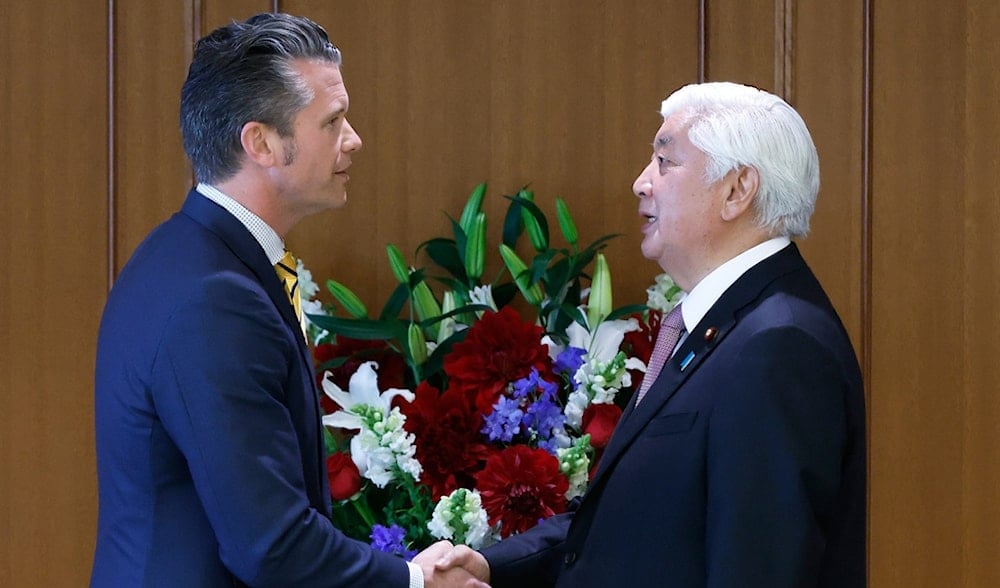Japan cancels US security talks over defense spending demands
Japan cancels the annual 2+2 meeting with the US after the Trump administration demands higher defense spending.
-

Japan's Defense Minister Gen Nakatani, right, and US Secretary of Defense Pete Hegseth shake hands during a joint news conference at the Ministry of Defense in Tokyo Sunday, March 30, 2025. (AP)
Japan has canceled a high-level annual security meeting with the United States after the Trump administration pushed for a steep increase in Japanese defense spending, the Financial Times reported Friday. The decision comes amid rising tensions over military budgets and just weeks ahead of Japan's upper house elections.
The 2+2 meeting, which was set to take place on July 1 in Washington, would have brought together Secretary of State Marco Rubio and Defense Secretary Pete Hegseth with Japanese Foreign Minister Takeshi Iwaya and Defense Minister Gen Nakatani. The talks were scrapped following a reported US demand that Tokyo raise its defense budget to 3.5% of GDP, up from an earlier request of 3%.
Japan's Nikkei newspaper added that Washington is seeking 5% of GDP in defense spending from all Asian allies. However, a Japanese Foreign Ministry official told Reuters that no such targets, 3.5% or 5%, had been formally discussed. He also cited scheduling challenges, including Hegseth’s focus on the Middle East crisis, as a reason for the postponement.
A US official confirmed to Reuters that Japan had postponed the talks weeks ago without specifying why. Non-government sources echoed this, while State Department and Pentagon representatives declined to comment on the FT report.
Timing linked to Japan’s elections, NATO summit
The FT report also linked the decision to Japan’s upcoming upper house elections on July 20, which pose a critical test for Prime Minister Shigeru Ishiba’s minority coalition government. In March, Ishiba rejected foreign influence on Japan’s defense budget following remarks by Pentagon official Elbridge Colby, who urged Tokyo to boost its military spending to counter China.
Colby’s role has stirred tensions with US allies. He recently initiated a review of the nuclear submarine project with Australia, adding to regional friction.
The canceled meeting comes ahead of a NATO summit in Europe, where President Trump is expected to renew his call for allies to spend 5% of GDP on defense. The demand mirrors his global push for increased burden-sharing within US alliances.
Japan and other allies have also faced strained trade negotiations amid Trump's aggressive tariff policies, compounding frustrations in bilateral ties.
As Tokyo shelves its key security dialogue with Washington, the decision signals deepening unease over Trump’s approach to alliance management and defense commitments.
'Everybody needs to do more'
Hegseth previously met with Nakatani to discuss Japan's defense spending as bilateral security ties deepen between both nations, but did not specify the number required by the US.
"We're confident that Japan will make the correct determination of what capabilities are needed inside our alliance to make sure we are standing shoulder to shoulder," he indicated.
"They have been a model ally and we have no doubt that will continue. But we also both recognise everybody needs to do more."
Nakatani, in turn, emphasized that Japan's defense spending decisions would be made based on its "own judgment and responsibility."
The US currently has 54,000 military personnel stationed in Japan, primarily in Okinawa, east of Taiwan.
Read more: Japan reports progress in US trade talks but no tariff agreement yet

 3 Min Read
3 Min Read








